Social Media Customer Service: Benefits & Best Practices
Delivering exceptional social media customer service enhances customer satisfaction and drives business growth. Learn how to provide top-notch support on social channels.

Delivering exceptional social media customer service enhances customer satisfaction and drives business growth. Learn how to provide top-notch support on social channels.

Have you ever encountered poor customer service on social media that left a negative impression? Maybe you sent a message to a company’s Facebook page or tweeted at their Twitter handle and received no response, or the response you did receive was unhelpful.
An increasing number of customers are flocking to social media for brand interaction. 84% of consumers expect companies to respond within 24 hours after posting on social media. Many companies struggle to handle social media customer service requests effectively. We have compiled an all-inclusive guide to mastering social media customer support. So let’s dive in!
Social media customer service can be defined as the support provided to customers through various social media platforms. It involves a dedicated customer support team or individual who swiftly responds to real-time customer inquiries, comments and concerns.
Social media service involves actively monitoring and engaging with customers on social platforms. Facebook, Twitter and Instagram are widely used to provide timely support. Social media support is like having a pocket-sized customer service hotline that delivers timely and tailored support.
The power of social media customer care helps businesses to address customer inquiries, maintain brand reputation and promote positive customer relationships in real time. Its primary objectives are as below:
Below are the benefits of integrating social media into your customer support strategy and learning how it can elevate your brand’s reputation while facilitating strong customer relationships.
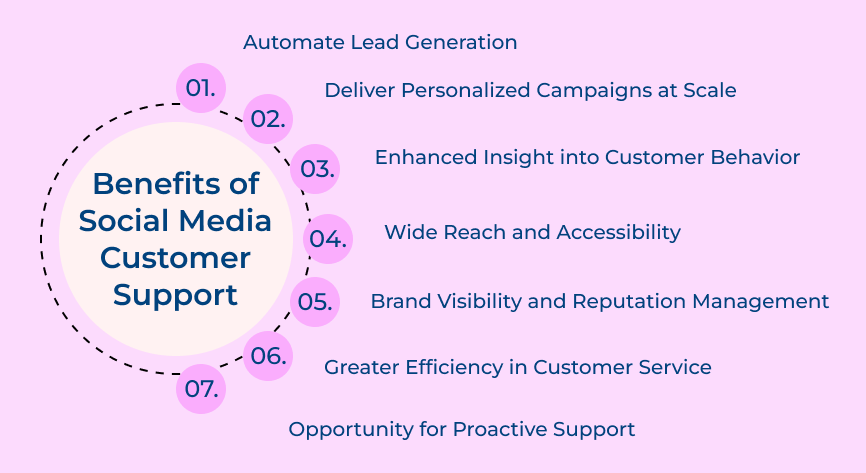
Social media provides an opportunity to identify potential customers through paid advertising campaigns or lead-generation tools. Automated lead generation allows the company to widen its reach and increase potential customer engagement while saving resources.
Using personalization engines along with the targeted content enables the social media marketers to create unique experiences for their followers based on their interests, behaviors and demographics. The personalized approach helps build trust with customers and enhance their experience with the brand.
Social CRM allows companies to gather customer data from various social media channels, which provides insight into customer wants and behavior. Analyzing data will help businesses identify emerging trends and make better-informed decisions when developing future products.
Social media platforms have billions of active users, providing businesses with a vast audience for customer service interactions. Customers can easily reach out to businesses through their preferred social media channels, making it a convenient and accessible support option.
Businesses can publicly showcase their commitment to customers through social media customer care. When customers have a good experience and get quick help when they need it, they’re more likely to trust the brand. If things go wrong, how a company handles criticism says a lot. Owning up and fixing the problem often matters more than the mistake itself.
Social CRM empowers agents managing inbound service requests by providing prompt support across multiple platforms without switching screens between disparate systems, resulting in faster turnaround time.
Social media strategy monitoring enables businesses to proactively identify and address customer concerns even before they reach out. Monitoring mentions, hashtags and comments enable businesses to intervene, offer assistance and provide relevant information. It shows a proactive commitment to customer service.
Following is the breakdown of the practical ways to tighten up your social media support game so you’re not just visible, but actually useful where it counts.
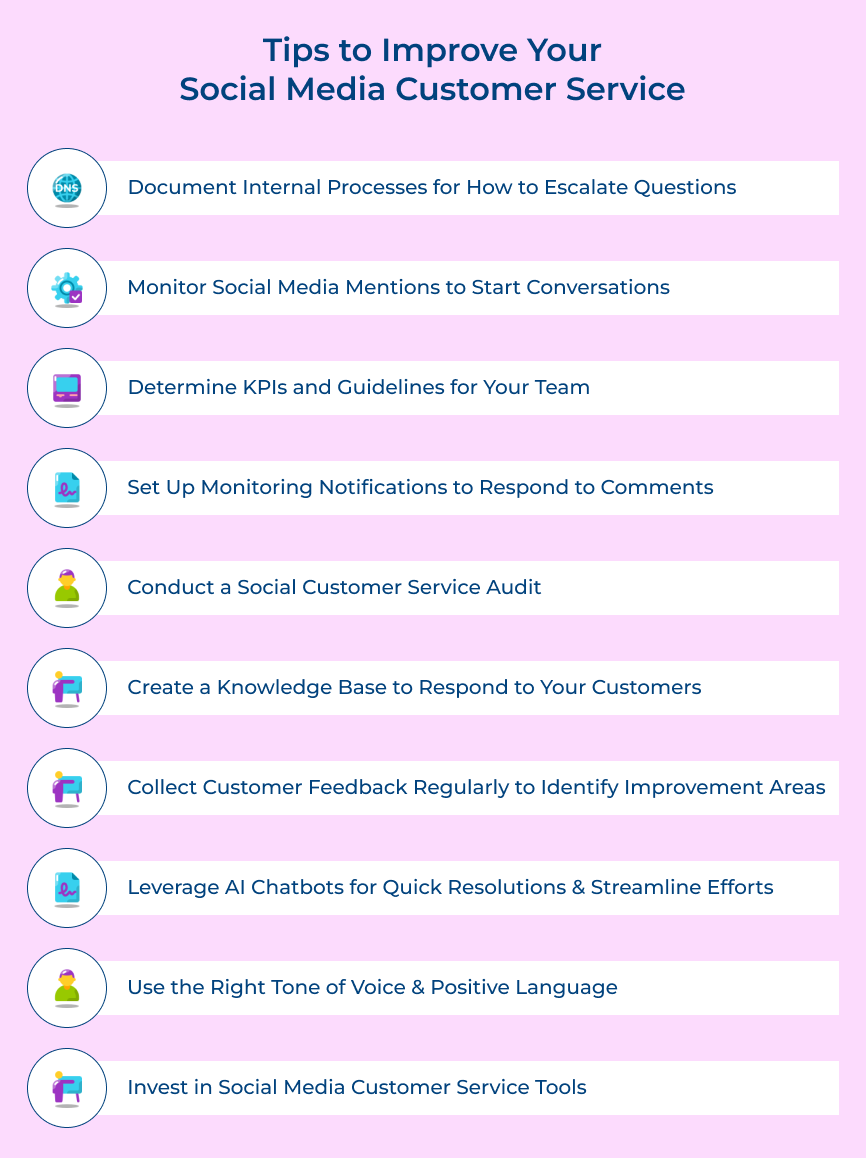
Ensuring your customer support team is well-equipped to handle questions or complaints on social media is crucial. Their ability to know how to respond in different situations can significantly impact customer satisfaction. It means having clear and documented internal processes that they can follow each time.
You may have procedures regarding which questions should be directed to other teams or how to escalate an issue if necessary. A good place to start is by creating standard operating procedures (SOPs) that outline how your team will handle common issues like refunds, product complaints, or shipping delays.
Monitoring social media mentions gives you a valuable understanding of your customers’ expectations and what they perceive about your business. You can even use these conversations to start new customer interactions, which could lead to increased engagement and loyalty.
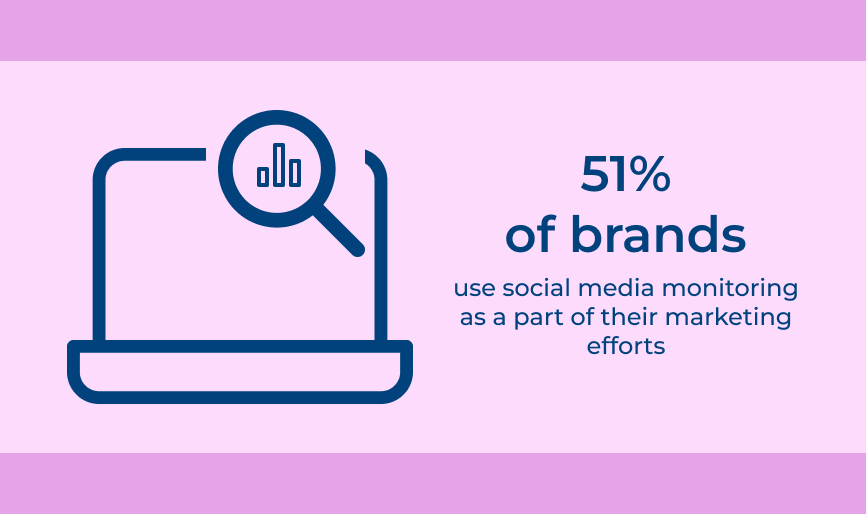
Social media customer service tools that can be used for monitoring mentions are Google Alerts or Brand24, which allows you to receive emails whenever your brand is mentioned on the web. You can quickly respond to complaints, comments, or questions by providing timely and relevant information.
Key Performance Indicators (KPIs) are essential in measuring team performance on social media. It helps agents or managers identify areas that need improvement and track how effectively the team responds to client feedback.
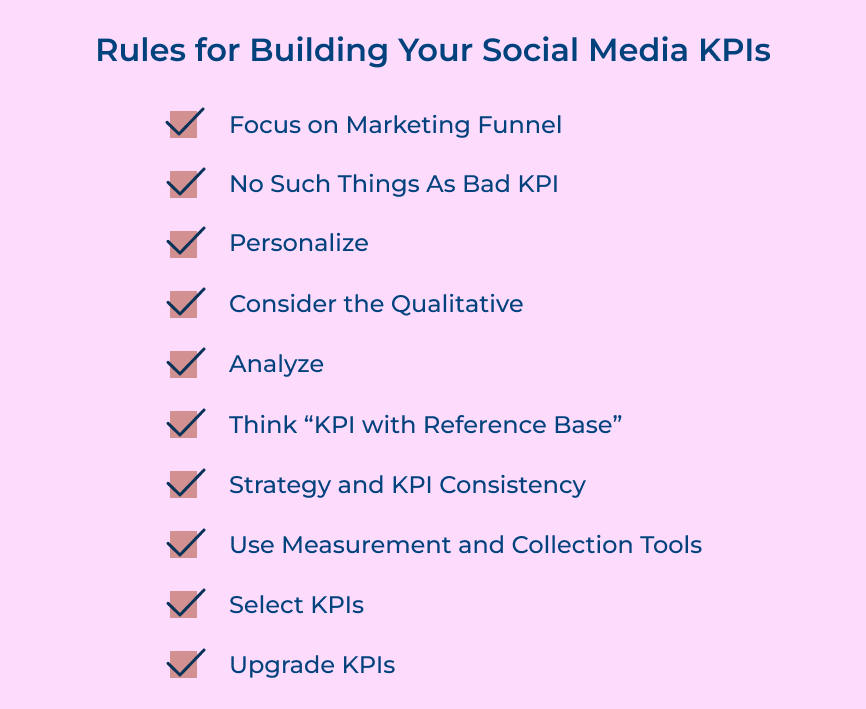
Creating a document or playbook outlining your processes, protocols, acceptable tone and language helps unify responses from all team members. As a result, consistency aids brand image management and gaining trust from customers.
Social media doesn’t sleep – and neither should your social media customer care team. In order to ensure no comment goes unnoticed, consider monitoring notifications across multiple channels where your business has a presence.
Receive timely notifications whenever someone interacts with your Facebook, Twitter, or Instagram profiles. Stay informed and reply promptly without any delay.
When you create an account with various channels for communication online, be sure to enable push notification alerts across different devices, including mobile phones, desktop apps, etc., so that you catch every comment in real-time and respond immediately.
A social customer service audit refers to a detailed analysis of all your social media accounts’ performance regarding customer service delivery. The audit involves reviewing past conversations with customers, analyzing response times, identifying frequently asked questions and looking at the overall sentiment around your brand.
A social customer service audit aims to identify areas for improvement and develop strategies for improving your social media customer support efforts.
Slow response times are a major annoyance for customers. When people reach for social media customer care, they anticipate quick replies. They might switch their patronage to another business if they don’t get the timely assistance they seek.
Companies that want to respond faster to their customers’ inquiries must create a comprehensive knowledge base. The self-service base should answer all the frequently asked questions. The knowledge base can be anything from articles, FAQs, or videos covering common issues customers face when using your product or services.
Ensure the website has a user-friendly navigation system and that its search feature functions accurately. Customers should be able to find answers quickly without needing additional assistance.
Companies can improve their social media customer service strategy by collecting and analyzing customer feedback on a regular basis. Listening carefully to customers and implementing their suggested improvements shows that you value their opinions.
Start by creating surveys or polls not only after every interaction but also after the completion of any campaign or initiative. Use such opportunities to identify areas where there’s room for improvement, such as response time or clarity of communication.
Once you’ve gathered feedback at scale, categorize it into relevant themes, then go through each category and pay attention to recurring issues. Use the data gathered from the feedback survey to identify where improvements need to be made and take action accordingly.
Customers expect fast social media customer service responses. Hiring a full-time team or outsourcing can be difficult to support such expectations. The AI chatbots can provide a much-needed solution by quickly resolving generic queries such as opening hours or delivery timespan. The average satisfaction rate of bot-only chats is 87.58%.
AI chatbots leverage natural language processing (NLP) along with machine learning algorithms to enhance their abilities through ongoing learning and refinement consistently. As they handle those easy-to-answer questions, your team will have more time available to work on complex issues that require human assistance.
Social media contact is often portrayed as an informal medium where casual language prevails. Delivering customer service through social channels still requires professionalism from all angles – especially when dealing with irate customers.
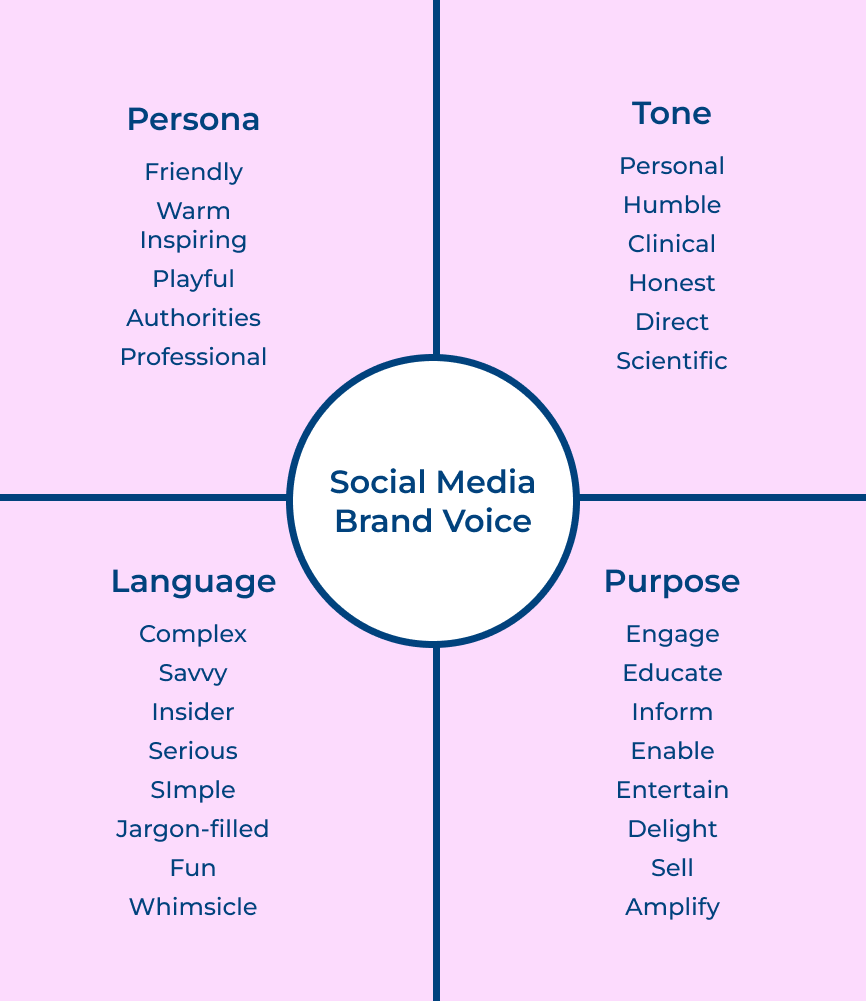
The teams should always use proper tone and respectful language when addressing each issue raised. While some comments may be abusive or not respectful towards your brand values or customer service team members, it is crucial never to react reflexively through negative communication.
Instead of reacting defensively in such situations, try pausing before responding by deleting negative words or phrases- focusing only on positive gestures and solutions. It proves much more effective in de-escalating an argumentative environment online while showing other followers how well you handle conversations positively.
There is a rising trend of using social media platforms such as Twitter and Facebook for seeking customer support. Businesses must prioritize the adoption of effective tools to monitor and respond to online discussions about their brand actively.
Social media customer service tools allow you to monitor all mentions of your brand across multiple channels in real time. Monitoring your brand’s reputation on social media platforms will allow you to respond quickly when someone posts a negative comment or raises an issue.
The customer tools help identify trends in customer complaints or feedback so that you can address common issues proactively rather than react after receiving individual complaints.
If you’re striving to elevate your customer service game, understanding the best tools available is essential. Here’s a comprehensive guide to the top social media customer service tools that can transform the way you interact with your audience.
Veemo is the ultimate social media customer service tool designed to elevate your customer engagement efforts. With a suite of cloud-based software products, Veemo caters to different aspects of customer support and interaction on social media platforms.
Veemo ensures prompt responses and efficient communication by seamlessly integrating with prominent social media channels. It makes it the preferred choice for businesses of all sizes. Take your social media service to new heights with Veemo’s user-friendly interface and robust features.
Key Features:
Omni24 is a complete customer communications platform that offers social media customer support, live chat, email marketing and ticket management features around the clock. Some of its unique features include compatibility with Facebook Messenger.
Customers can reach out to the business via Messenger and receive real-time support. Teams can interact with customer support within the tool and use intuitive campaign creation tools for sending personalized messages.
Key Features:
A famous tool for managing social media, Hootsuite helps you to handle multiple social media accounts in one place and simplifies marketing efforts. It also offers features to manage customer service on social media effectively.
Key Features:
Brand24 is another popular tool for monitoring brand conversations on social networks, forums, blogs, news sites, etc. It is especially helpful when identifying potential PR issues or handling customer complaints because you can track keywords corresponding to specific feedback types.
Key Features:
Below are the standout brands that exemplify outstanding social media customer service, showcasing how they handle queries, resolve issues and turn their customers into lifelong fans.
1. JetBlue Airways
JetBlue Airways is a leading airline company that has been consistently ranked high for its excellent customer service. The brand primarily focuses on providing personalized interactions with customers, a trait that perfectly translates to their social media accounts.
The brand’s Twitter account remains active around the clock, responding to queries regarding flight reservations, cancellations, or delays within minutes. They also often exhibit humor in their responses and ensure they engage with their loyal followers regularly.
2. Xbox Support
Xbox support has focused on creative solutions when assisting customers through social platforms like Twitter or Facebook.
They acknowledge product complaints within minutes through Twitter and offer immediate remedies online; it shows how responsive the customer support team is in addressing their customers’ concerns. Some of these remedies come in the form of step-by-step illustrated solutions sent via tweets, making them helpful and entertaining to read.
3. Warby Parker
Warby Parker provides excellent social media communication by utilizing different channels such as Instagram and Twitter.
Apart from building interest around upcoming releases through eye-catching photography highlighting styles from new collections, Warby employs dedicated agents who attentively respond to each review or comment across various platforms with detailed answers about product queries or retailers’ inquiries
4. Wendy’s
Wendy’s has carved out a unique voice online by doing something most brands avoid – being unapologetically bold. Their quick-witted comebacks, playful jabs at competitors and offbeat meme replies haven’t just entertained people, they’ve turned fast food marketing into internet culture.
What makes it work isn’t just humor, but timing, tone, and knowing exactly what their audience finds worth sharing. They’ve built an online presence that’s genuinely funny and human. Instead of constantly pushing products, they focus on real conversations. That’s what keeps people coming back and engaging for the right reasons.
Customers expect seamless experiences across all channels, including social media. Effective social media contact plans are essential for businesses to meet these expectations and create a positive brand image. Personalization plays a crucial role in creating a positive CX. Businesses must strive to comprehend their customers’ desires and preferences.
Brands must continuously improve their social media customer service plan by analyzing metrics such as response time and feedback from customers. They must prioritize the proactive adoption of the strategy to excel against competitors and successfully meet the evolving demands of their customers
Customer care refers to the overall process of addressing customer needs and concerns throughout their journey with a business. It encompasses all interactions, touchpoints, and support provided to customers. Customer service refers to the support and assistance given to customers throughout their interaction with a company. It involves addressing their needs and ensuring their satisfaction through personalized interactions.
Key metrics for measuring social media customer service include the response time: The average time it takes to respond to customer inquiries or complaints. Resolution time: The average time taken to resolve customer issues. Customer satisfaction: Measuring customer sentiment and feedback through surveys or sentiment analysis. Engagement rate: The level of customer interaction, such as likes, comments and shares, on social media posts related to customer service.
Essential tools for effective social customer care include social media management platforms like Veemo Support and Omni 24. They help monitor multiple social media channels in a centralized dashboard. Customer relationship management (CRM) software provides a holistic view of customer interactions and enables managing customer support cases.
Effective customer service on social media should involve the following best practices:
Companies can increase customer loyalty and efficiency on social media through the key steps. Utilize chatbots and automated responses for common inquiries to handle initial interactions to free up human resources. Develop a system to categorize and prioritize customer inquiries based on urgency or complexity to ensure timely responses. Create and promote FAQs, knowledge bases, or tutorial videos that empower customers to find answers independently.

Market better, sell faster and support smarter with Veemo’s Conversation Customer Engagement suite of products.
Unify all your customer data in one platform to deliver contextual responses. Get a 360 degree view of the customer lifecycle without switching tools.
Connect with the tools you love to reduce manual activities and sync your business workflows for a seamless experience.
 https://veemo.io/wp-content/uploads/2025/12/customer-connection.png
1256
2400
Indrasish Singha
https://veemo.io/wp-content/uploads/2024/11/veemo.svg
Indrasish Singha2026-02-06 09:11:372026-01-19 09:14:05What is Customer Connection: Mistakes, Metrics & Examples
https://veemo.io/wp-content/uploads/2025/12/customer-connection.png
1256
2400
Indrasish Singha
https://veemo.io/wp-content/uploads/2024/11/veemo.svg
Indrasish Singha2026-02-06 09:11:372026-01-19 09:14:05What is Customer Connection: Mistakes, Metrics & Examples https://veemo.io/wp-content/uploads/2025/12/complaint-management.png
1256
2400
Indrasish Singha
https://veemo.io/wp-content/uploads/2024/11/veemo.svg
Indrasish Singha2026-02-03 09:04:022026-01-19 09:10:02What is Complaint Management? Importance, Key Steps & Strategies
https://veemo.io/wp-content/uploads/2025/12/complaint-management.png
1256
2400
Indrasish Singha
https://veemo.io/wp-content/uploads/2024/11/veemo.svg
Indrasish Singha2026-02-03 09:04:022026-01-19 09:10:02What is Complaint Management? Importance, Key Steps & Strategies https://veemo.io/wp-content/uploads/2025/12/AI-Self-Service.png
1256
2400
Indrasish Singha
https://veemo.io/wp-content/uploads/2024/11/veemo.svg
Indrasish Singha2026-01-26 09:52:482026-01-13 10:17:07What is AI Self Service? Benefits, Key Metrics and Best Practices
https://veemo.io/wp-content/uploads/2025/12/AI-Self-Service.png
1256
2400
Indrasish Singha
https://veemo.io/wp-content/uploads/2024/11/veemo.svg
Indrasish Singha2026-01-26 09:52:482026-01-13 10:17:07What is AI Self Service? Benefits, Key Metrics and Best PracticesGrow Customer Relationships and stronger team collaboration with our range of products across the Conversational Engagement Suite.

 Help Desk SLA: Measuring and Optimizing Service Levels
Scroll to top
Help Desk SLA: Measuring and Optimizing Service Levels
Scroll to top